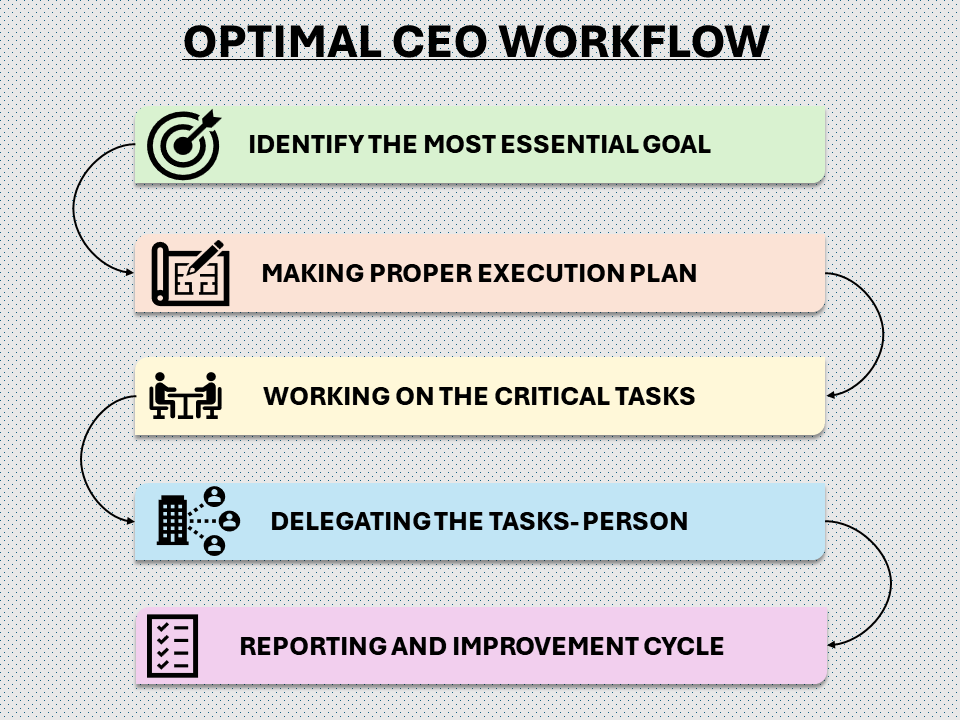Delegating Tasks is one of the most crucial skills for today’s Business Landscape. MSMEs often find themselves consumed by day-to-day “firefighting” activities, resulting in reports of zero productivity. Furthermore, have you ever noticed how business owners often end up significantly busier than their teams? While their efforts are commendable, many struggle to master the art of task delegation. They toss around reasons like not trusting the team, feeling more efficient themselves, or the team not taking ownership. The real deal? They either haven’t given delegation a shot or haven’t quite cracked the code on how to do it effectively.
Take a glimpse into the routines of top Indian CEOs, and you’ll find their game plan is straightforward. First up, they pinpoint the big goals, then craft a killer execution plan. Next, they dive into the nitty-gritty of critical tasks, delegate like pros, and wrap it all up by giving you the lowdown on the project. It’s like a strategic dance for success!

If you really want to grow as an entrepreneur, you’ve got to learn to delegate.
– Richard Branson, founder of Virgin Group
THE M.C.D PRINCIPLE
Effective Leaders follow the M.C.D. Principle to manage their teams and tasks. M stands for Managing, C stands for Controlling and D stands for Delegating. When welcoming new team members to a project, start by guiding them hands-on – like putting the training wheels on. Once they’ve got the hang of things, it’s like turning into their coach. You start giving them regular feedback to fine-tune their skills. And when you see they’ve nailed it, that’s your cue to let them spread their wings and take charge – that’s delegation kicking in! It’s all about that gradual journey from hands-on management to hands-free empowerment.

WHY DELEGATING TASKS IS IMPORTANT?
A study by the Kauffman Foundation in 2018 found that companies experiencing rapid growth tend to delegate tasks more often to their employees compared to businesses with slower growth rates. This suggests that effective delegation might be a key factor in achieving significant business growth.
A 2017 Harvard Business Review study found that leaders who delegate tasks well benefit from the variety of viewpoints and knowledge their teams offer. This can lead to better decisions and problem-solving compared to situations where the leader makes choices alone.
A 2021 Gallup report suggests that employee engagement and job satisfaction are positively correlated with the utilization of their existing skills and the provision of opportunities for skill development. Delegation can be a powerful tool to achieve this, as it allows employees to use their skills on different tasks and gain experience in new areas. This can ultimately lead to a more positive and productive work environment for everyone.
A 2023 study by the American Psychological Association highlights the importance of managing stress for successful entrepreneurs. Delegation can be a powerful tool to help you achieve this. By delegating tasks, you can lighten your workload, freeing up valuable time and energy to focus on strategic planning and important decisions. This can ultimately lead to reduced stress and burnout, allowing you to be a more effective and successful entrepreneur.
The above data is enough to convince anyone about the Importance of Delegation and how delegation plays a crucial role in the success of a Leader. Now let’s dive deeper into the execution plan of delegation:
5 STEPS TO DELEGATE ANY TASK
- Identifying the right person: The first and foremost task is to assign the right person for the task you’re looking to delegate. Majorly, one should answer 3 core questions: What Personality Trait I am looking for in the person? , Is the person passionate and dedicated to the project? Lastly, is the individual receptive to feedback? Are they open to learning and adapting to the new processes or methods that you plan to introduce during the review cycle?

- Checking Proficiency: After identifying the right person, the next step is to check the proficiency. Always remember, nothing like ‘Perfect’ exists in this world. Discuss the execution plan with him/her and try to access that at which point he needs training. It’s preferable to demonstrate how you execute the task first and then encourage them to replicate it (employing a “First, I do, you see, and then you do, I see” approach).

- Execution: You’ve found the perfect fit, checked their skills, and given them the know-how. Now, the big moment: execution! This is where some leaders stumble – either they micromanage everything or take a hands-off approach. It’s all about finding that sweet spot! Just keep yourself in the loop by reporting on the progress. Do it daily, weekly, fortnightly, or monthly – whatever suits the task’s importance. Stay connected with how things are rolling!

- Reporting: You’re familiar with the saying, “Achievement comes from what you measure!” Consider yourself the driver. Your team (legs) manages the essentials (ABC – Accelerator, Brake, Clutch), and your primary responsibility involves steering and monitoring the route (dashboard and track). However, here’s the twist – numerous Indian Business Owners are excessively immersed in the basics, neglecting effective course steering.

One of the simplest ways to report any task is to measure the effort and result scores. Often, business owners confuse reporting with a fancy digital tool kit where they need to invest money to track the teams. However, the same outcome can be achieved simply with the help of a pen and paper. The attached framework explains more about reporting the tasks. - Improvement Cycle: People spent a lot of time in reporting sessions. Hours of reporting sessions conclude zero results. Three simple outcomes must be reported on during reporting sessions: What Went Well, What Went Wrong, and What Could be Improved. This Improvement Cycle will save hours of meeting time and your reporting sessions will always be crisp and to the point.
Delegating tasks not only streamlines your daily workload but also fosters increased employee engagement. We’ve also made a video on “How to Retain & Engage Employees” for your further reference:
From understanding the basic concept, need and importance of delegation to learning the proper execution steps of delegation; we’ve covered in this article. Remember, just reading this article or watching any video does not help grow your business or solve your daily business problems. Execution is the only key- and for the same, download the delegation framework:
Craving solutions to your complex business problems? Subscribe to our newsletter to stay informed about the latest strategies and insights. Want to share your expertise? We invite you to drop your views on delegation in the comments section below.





